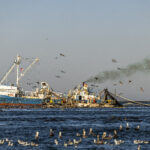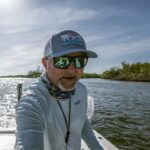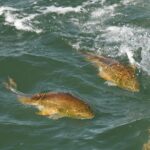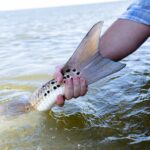
Gulf Menhaden Reduction Fishery: Bycatch Research & Useless Buffer Zones
Do you remember your driver’s test? How nervous were you when the instructor pulled out
Tony Friedrich VP/Policy Director ASGA
On October 20, 2020, Congressman Grijalva (D-AZ-3), Chairman of the House Natural Resources Committee (HNRC), introduced new legislation called the Ocean-Based Climate Solutions Act (H.R. 8632).
It is our job to make sure our readers are aware of potential changes to how we manage our oceans. Please consider this article a high-level overview of the bill as it sits now. This is a massive bill. The section by section breakdown can be seen here and gives you some insight into what it is trying to accomplish:
H.R.8632 – To direct the Secretary of Commerce, acting through the Administrator of the National Oceanic and Atmospheric Administration, to provide for ocean-based climate solutions to reduce carbon emissions and global warming; to make coastal communities more resilient; and to provide for the conservation and restoration of ocean and coastal habitats, biodiversity, and marine mammal and fish populations; and for other purposes.
The bill contains fifteen separate sections and currently includes several hundred pages of language. Here is a peek at the table of contents.
TITLE I—BLUE CARBON
TITLE II—MARINE PROTECTED AREAS
TITLE III—OFFSHORE ENERGY
TITLE IV—CLIMATE-READY FISHERIES, EFFICIENT FISHERY VESSELS, AND BUY AMERICAN SEAFOOD
TITLE V—COASTAL BARRIER RESOURCE ACT AMENDMENTS
TITLE VI—COASTAL ZONE MANAGEMENT ACT
TITLE VII—INSULAR AFFAIRS
TITLE VIII—STRENGTHENING MARINE MAMMAL CONSERVATION
TITLE IX—INTERNATIONAL AGREEMENTS, EFFORTS IN THE ARCTIC, AND BUREAU OF INDIAN AFFAIRS TRIBAL RESILIENCE PROGRAM
TITLE X—COASTAL RESILIENCY AND ADAPTATION
TITLE XII—NATIONAL OCEAN POLICY, DATA, AND COORDINATED WEBSITE FOR GRANT PROGRAMS
TITLE XIII—COASTAL WETLANDS
TITLE XIV– MEASURES TO ADDRESS GREENHOUSE GAS POLLUTION FROM SHIPPING VESSELS
TITLE XV—STUDIES AND REPORT
You can see just from the table of contents; this is sweeping legislation. When bills of this magnitude are introduced, it is common to agree with sections while having concerns with others. This will certainly be the case with our breakdown of H.R. 8632. However, it is critical that we embed ourselves in the conversation if we want to represent you, our members. There are a few takeaways that we feel comfortable sharing at this juncture.
First and foremost, if you fish in saltwater, you know stocks are shifting. Summer flounder, black sea bass, and several other important coastal fish are moving north. It is well documented. If you have any doubts, ask anyone who fishes Rhode Island and Massachusetts about black sea bass. When stocks shift, issues arise between states regarding allocation and quotas. Shifting stocks also create predator-prey relationships that never existed before. Don’t believe us? Ask any lobster fishermen how they feel about black sea bass. We fully support better funding for scientists to better manage for these massive shifts. Some of these concepts will likely appear in a Magnuson discussion draft as well.
There are other particularly good aspects of this legislation. Protection of coastal wetlands, blue carbon, addressing harmful algal blooms in Florida, as well as coastal resiliency and adaptation (much needed funding for habitat work) are all issues we support.
There are other sections that are more concerning. We try not to be critical without offering solutions. So, look forward to a broader blog detailing these issues. If you would like to follow the bill more closely, there is a hearing scheduled for next Tuesday.
Make no mistake, the Ocean-Based Climate Solutions Act has legs, even in this political environment. This legislation is coming from the Chairman of the House Natural Resources Committee. You probably recall us referring to the Water, Oceans, and Wildlife subcommittee of HNRC. Well, Congressman Grijalva oversees that subcommittee. In other words, he is a well respected and influential member of the House. Any legislation coming out of his office is significant. The language in this bill is reflective of the priorities within the House of Representatives and we can expect to continue to see it throughout the next congress starting in January.
Second, H.R. 8632 already has 28 co-sponsors and has been referred to several committees. That is significant for several reasons. It shows broad support across the country. It also shows strong intent as we have been focused on elections as well as a global pandemic.
For now, know that we are monitoring this legislation very closely. Be on the lookout for more information later this fall.

Do you remember your driver’s test? How nervous were you when the instructor pulled out

If you’ve spent any time on the water in South Florida, chances are you’ve heard

Photo Credit: Graham Tayloe Big Win for Redfish in Alabama Huge news from the Marine

Feature Photo: Carter Abramson | Simms Fishing at the Fisheries Science Symposium We have more
We rely on our members and donations to keep fighting for a sustainable tomorrow in marine conservation.
GIVE THE GIFT OF FISHERIES CONSERVATION THIS HOLIDAY SEASON. SHOP ASGA GOODS THAT FUND FISHERIES RESEARCH & ADVOCACY CAMPAIGNS
JOIN ASGA IN CALLING FOR CRITICAL MANAGEMENT ACTION AFTER YEARS OF SPAWN FAILURES & POOR MANAGEMENT.
By using this website, you agree to our use of cookies. We use cookies to provide you with a great experience and to help our website run effectively. To learn more, please review our privacy policy.